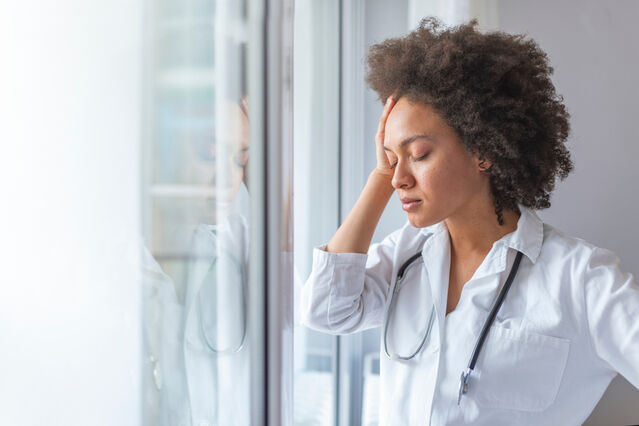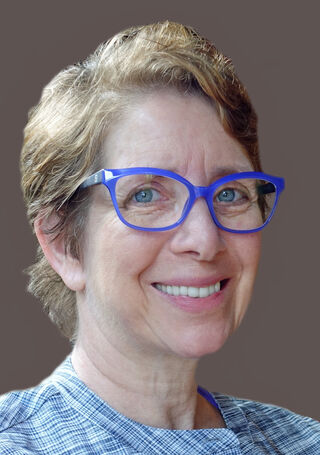Health
How to Support Mental Health in COVID First Responders
How can clinicians on the frontlines overcome stress, anxiety, and grief?
Posted June 15, 2020

As the COVID-19 pandemic began tearing through New York City, leaders at Mount Sinai Health System began to explore how they could help doctors and nurses heal from the stress, anxiety, depression, and PTSD that many, inevitably, would confront.
The institution created the Mount Sinai Center for Stress, Resilience, and Personal Growth, which opens its doors to employees today. PT spoke with Director Deborah Marin, Professor of Psychiatry and also Director of the Center for Spirituality and Health, about how to support the mental health of those on the frontlines of the pandemic.

Can you tell me what being in the hospital was like at the peak of the crisis?
It was a jarring and upsetting experience to see what the floors looked like. Folks go into health care delivery because they want to make people feel better. The people who came to the ICU were so sick, it was devastating.
One of the biggest things in ICUs is you want the patient to be seen, and people go in and out of the rooms all the time. But COVID rooms were closed for isolation purposes and everyone avoided contact with the patient. There were rows of folks on ventilators, in isolation rooms with monitors outside. And the garb people had to wear to work—you could see how uncomfortable it was to suit up.
It felt not the way we like to practice medicine. We’re very high-tech but we’re very high-touch, too. We like to hold people’s hands and check on people, and chaplains love to speak to patients. Yet so much was done by telehealth.
What are the most common mental health challenges that research suggests medical workers will face?
We know that a large percentage of folks are experiencing grief, sadness, loss, and anxiety. Anxiety not just about getting sick but about getting loved ones sick. People are also feeling depressed and showing signs of PTSD.
Because COVID-19 is so highly infectious and mercurial in its presentation, we don’t exactly know the best practices and treatments yet. It doesn’t allow health care workers to do what we do really well, which is follow algorithms. We’ve developed algorithms from everything we know, but there’s still a lot of uncertainty. And this illness is only under control because we’re basically on lockdown. There’s tremendous fear of another wave.
People were also redeployed. In our cardiovascular institute, for example, people typically come in, get stents and get bypasses, recover, and go home. Our first COVID unit was our cardiac care unit, where it became medical intensive care units with such sick people. That's jarring for health care workers. Their roles changed. They were no longer doing things they were used to doing.
Folks were upset that we couldn’t let family members in. In order to keep everybody as safe as possible, people were dying without their families next to them. Usually we love family members in our hospitals. That was a huge missing piece.
The other challenging aspect is that health care workers have so many other issues going on. Work-life balance has been disrupted, schools have been closed. People wonder, “Am I available enough for my kid? How am I going to get my job done?”
What provided health care workers with hope?
When nurses and doctors would clap when people would leave the hospital, it was so elevating. We had a whiteboard in the lobby, like “X number of patients discharged today!” It was striking.
I’ve seen such a sense of collegiality while developing the center. People want to connect with one another and share their feelings.
What programs will the new center provide?
The model includes different approaches to offer the health care workforce free screening for how they’re doing, by phone with a trained social worker or with an app that measures some of their symptoms and their health. They’ll be given feedback on how they’re doing and resources they can use to take care of themselves and function as best as they can.
We’ve also developed a curriculum based on 10 major tenets of resilience. Each workshop is about a core facet of resilience, such as spirituality, finding a moral compass, or physical activity.
There will also be a seamless relationship with psychiatry so that people who need help will be able to access mental health services. The idea is to mitigate the development of what we unfortunately know is going to come over the next few months. That’s the clinical arm, and there’s a research arm too.
How can health care workers and society more broadly move forward?
An important issue right now is to let people know things they can do to help themselves and others and find meaning. There can be growth after these events, when people realize that they’re problem-solvers or they did something they never thought they could do. Thoughts like: “I didn’t know I had it in me.” There’s a lot of meaning-making happening.
We’re a resilient species in general. But sometimes our reasoning may not be as good, and we need to teach people how to take a breath, be mindful, and make sure they’re attending to their own needs. Self-care is a big part of this. Staying connected is also helpful. We have a buddy system across the hospital system so that people have colleagues to talk to.
Will the pandemic lead to any lasting changes in the way medicine is practiced?
Telehealth was robustly used, so that’s an obvious change. I’m a psychiatrist by training and psychiatry is a great field in which to do telehealth. There’s no physical exam. What I’ve heard so far is patients have been very engaged with telehealth. I think doctors are readily available, and in some ways it makes it easier to get care because you don’t have to schlep in and travel an hour and a half just to meet me.




